Pinocchio [ESP-ING]
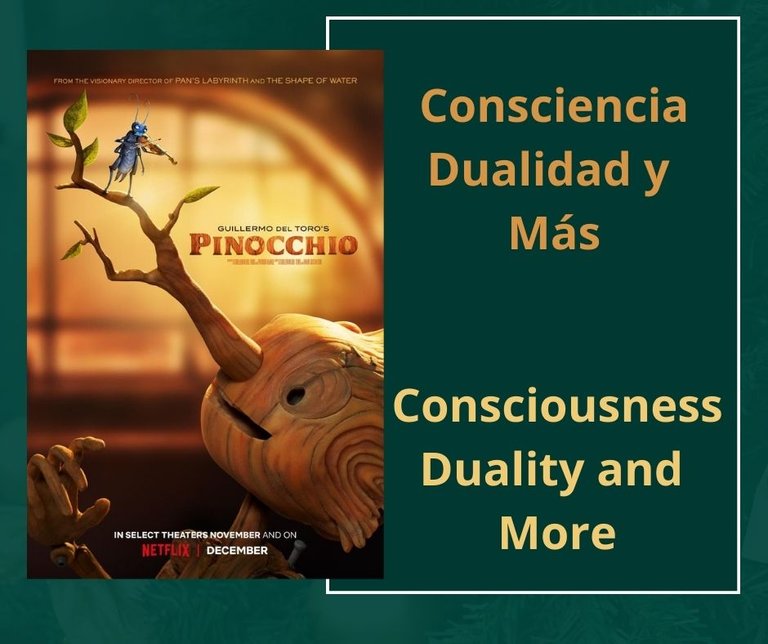
Saludos amigos de @moviesonhive tiempo sin pasearme por estos lares, pues mi televisor se quedó obsoleto y no hay manera que me motive a ver una película en mi lugar de trabajo, sentada frente a la computadora, para mi ver una película significa placer y el mejor lugar es en la intimidad de la habitación y la comodidad de mi cama.
La semana pasada resolvimos la situación y entre las películas que encabezan mi lista de pendientes se encontraba Pinocho de Guillermo del Toro, una película laureada y de alta repercusión en el mundo fílmico que me entusiasmaba ver, no solamente era eso, también estaba presente la conexión con la vivencia infantil y la interpretación que haría el reconocido cineasta a la versión de un cuento que no figura entre mis preferidos.
Y es que Pinocho, a mi entender, nunca fue un cuento bonito para niños, sus moralejas, más que inspirar hacia el bien, pueden llenarnos de miedos y culpas. Miedo a ser distintos, a expresar los sentimientos, a romper reglas preestablecidas, aunque estas no tengan fundamentos y con ello viene el castigo y la culpa. En estos aspectos centraré mi reseña.
Contextualizando
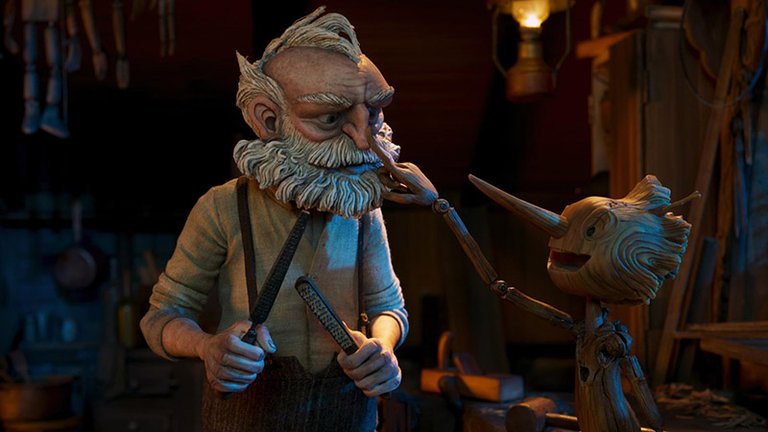
Guillermo del Toro con una ilustración perfecta nos va narrando la historia de un triángulo afectivo macado por la pérdida. Gepetto, el carpintero del pueblo, pierde a su amado hijo Carlo, en un bombardeo fortuito y con ello nos introduce al contexto temporal del film, que le sirve de base para mostrar la realidad de los pueblos que viven bajo regímenes totalitarios, en este caso la Italia de los años 20.
Una atmósfera que logra con unos tonos sepias y una iluminación que sin ser opaca nos envuelve en la sensación de oscurantismo y miseria que producen las guerras, las creencias y el sentimiento de dominación e indefensión. Apuntalado con una música cuyas letras conmueven y le dan contexto a cada situación.
A medida que va avanzando, el relato introduce aspectos puntuales como la escuela y su función reguladora de la conducta que responde a la ideología del estado y que se extiende a lo social e individual, resaltando aspectos como que la expresión del miedo es símbolo de debilidad, de falta de valentía y coraje, cuestión que un hombre no puede permitirse, entonces el mensaje es claro, los hombres no lloran, un concepto de larga data y que aún sigue haciendo mella.
La dualidad
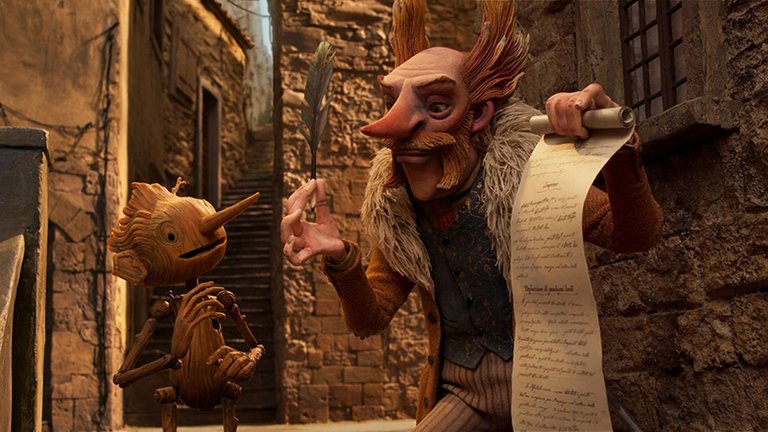
Al mismo tiempo en la trama surge la contradicción, Gepetto, tras la pérdida del hijo, sufre, llora, muestra su inconformidad ante Dios y finalmente, en medio de su soledad y añoranza, crea a Pinocho a quien un hada le da vida y, junto a esta, le asigna una conciencia para que la marioneta aprenda a distinguir entre el bien y el mal.
La consciencia, la vocecita interior a la que en muchas ocasiones no hacemos caso y Pinocho no es la excepción, sufriendo las consecuencias de este accionar al meterse en problemas que llevan a Gepetto a compararlo con su hijo muerto, mostrando decepción, inconformidad e insatisfacción, lo que genera en Pinocho culpas y más rebeldía.
El director es un maestro para ir mostrando las dualidades, nos presenta en un paralelismo constante la hermandad entre la vida y la muerte, el bien y el mal, la razón y la emoción, la esclavitud y la libertad, la aceptación del otro y el rechazo.
También nos muestra como una situación común puede solidarizarnos con el otro, despertando a una empatía, no conocida, pero que la vivencia nos pone del mismo lado: el niño que es oprimido bajo la bota militar del padre o el mono que es humillado y explotado en nombre de la avaricia. Pinocho, es un mensajero de lo diferente, es una propia consciencia de un despertar interior que mueve a acciones distintas.
Tras todo un mundo de aventuras traumáticas como la guerra, la ballena, la explotación laboral, el duelo por la pérdida del ser querido, Del Toro nos va acercando a un final feliz, donde nuevos y mejores caminos se abren, llenándonos de una agradable sensación de que nada es permanente, que todo es susceptible a ser cambiado cundo ponemos empeño en ello.
Guillermo del Toro nos regala en este film una versión de la vida y unas lecciones para reflexionar desde lo individual y lo social, no sin méritos ha sido aupada por la crítica y merecedora de los mayores galardones.
Si no la has visto, este fin de semana es una buena elección, eso sí, no es la mejor opción para el cine familiar, a menos que estés dispuesto a abrir un espacio de discusión, pues da para eso y mucho más.

In English

Greetings friends of @moviesonhive, I haven't been around these parts for a while because my TV is obsolete and there is no way I can motivate myself to watch a movie at my workplace, sitting in front of the computer, for me watching a movie means pleasure and the best place is in the privacy of my room and the comfort of my bed.
Last week we resolved the situation and among the movies at the top of my pending list was Pinocchio by Guillermo del Toro, an award-winning film with high repercussion in the film world that I was excited to see, not only was that, there was also the connection with the childhood experience and the interpretation that the renowned filmmaker would make to the version of a story that is not among my favorites.
And the fact is that Pinocchio, in my opinion, was never a nice story for children, its morals, rather than inspiring us towards the good, can fill us with fears and guilt. Fear of being different, of expressing feelings, of breaking pre-established rules even if they are unfounded, and with that comes punishment and guilt. I will focus my review on these aspects.
Contextualizing
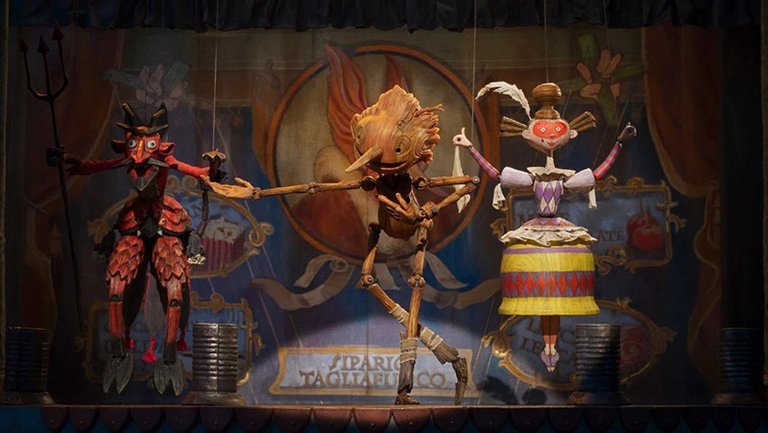
Guillermo del Toro, with a perfect illustration, narrates the story of an emotional triangle marked by loss. Gepetto, the village carpenter, loses his beloved son Carlo, in a fortuitous bombing and thus introduces us to the temporal context of the film, which serves as a basis to show the reality of people living under totalitarian regimes, in this case Italy in the 1920s.
An atmosphere achieved with sepia tones and lighting that without being opaque envelops us in the feeling of darkness and misery produced by wars, beliefs and the feeling of domination and helplessness, underpinned with music whose lyrics move and give context to each situation
.
As the story progresses, it introduces specific aspects such as the school and its regulatory function of behavior that responds to the ideology of the state and that extends to the social and individual, highlighting aspects such as the expression of fear as a symbol of weakness, lack of bravery and courage, a matter that a man cannot afford, so the message is clear, men do not cry, a concept of long standing and that still continues to make a dent.
Duality
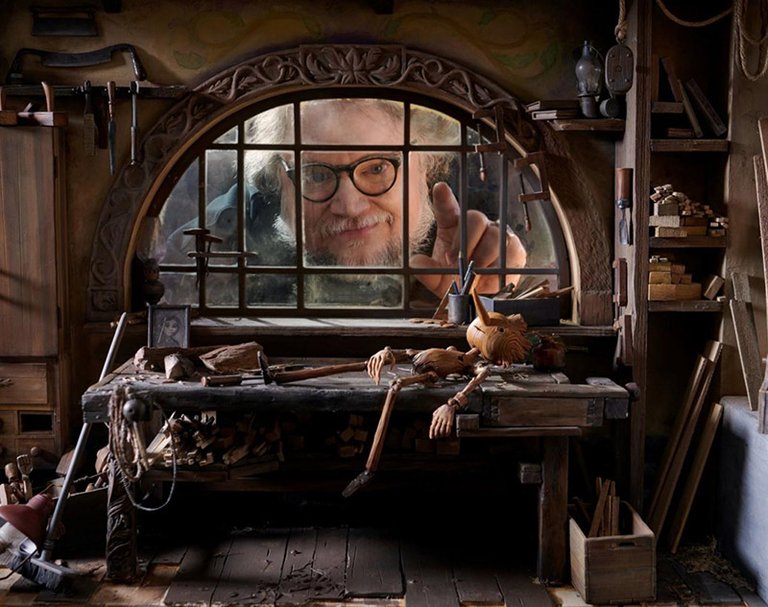
At the same time, contradiction arises in the plot, Gepetto, after the loss of his son, suffers, cries, shows his disagreement before God and finally in the midst of his loneliness and longing creates Pinocchio to whom a fairy gives life and, together with this, assigns him a conscience so that the puppet learns to distinguish between good and evil.
The conscience, the inner voice that we often ignore and Pinocchio is no exception, suffering the consequences of this action by getting into trouble that leads Gepetto to compare him with his dead son, showing disappointment, dissatisfaction and dissatisfaction, which generates in Pinocchio guilt and more rebellion.
The director is a master at showing dualities, presenting in a constant parallelism the brotherhood between life and death, good and evil, reason and emotion, slavery and freedom, acceptance of the other and rejection.
It also shows us how a common situation can make us feel solidarity with the other, awakening an empathy, not known, but that the experience puts us on the same side: the child who is oppressed under the military boot of the father or the monkey that is humiliated and exploited in the name of greed. Pinocchio is a messenger of the different, it is an awareness of an inner awakening that moves to different actions.
After a whole world of traumatic adventures such as war, the whale, labor exploitation, mourning for the loss of a loved one, Del Toro brings us closer to a happy ending, where new and better paths open up, filling us with a pleasant feeling that nothing is permanent, that everything can be changed when we put our minds to it.
Guillermo del Toro gives us in this film a version of life and some lessons to reflect from the individual and social, not without merit has been praised by critics and deserving of the highest awards.
If you have not seen it, this weekend is a good choice, but it is not the best option for family cinema unless you are willing to open a space for discussion, because it gives for that and much more.

Translated with www.DeepL.com/Translator (free version)
Fuente de imágenes; Portada - 1-2-3-4



MIS REDES SOCIALES





Be Entrepreneur
Portada https://www.filmaffinity.com/es/filmimages.php?movie_id=563328
https://www.filmaffinity.com/es/filmimages.php?movie_id=563328
https://www.filmaffinity.com/es/filmimages.php?movie_id=563328



Hola amiga, esta nueva adaptación fue un gran éxito en el mundo del cine, la cual logró llevarse muchos premios y reconocimientos por el excelente trabajo por parte del director, además una película que está cargada de muchos mensajes, aventura y sobre todo ver la vida de ese personaje tan cariñoso, la cual nos ha acompañado desde muy pequeño, donde la vida es una y se tiene que aprovechar cada oportunidad. Genial que te hayas animado a verla.
Hola @davidpena21. La película tiene mucho que sacarle y el trabajo realizado es impecable. Gracias por pasar y comentar.
Guillermo del Toro is known for making great cinematic deliveries, the last thing I saw of his was The Cabinet of Curiosities. I have yet to see this film, from what I can see it has a good message to reflect on.
Está adaptación fue todo un éxito, los mensajes que guarda no tienen precio, muchas enseñanzas en poco tiempo. La manera de hacer la película solamente lleva un premio, muy acertada por Guillermo del Toro. Es una película que no importa el genero que te guste , debes verla , a mí me encantó. Gracias por compartir está reseña , me gustó mucho
Buenas tardes @dahpilot, tu comentario recoge muy bien lo que está película aporta y como dices hay que verla.
La tengo pendiente desde hace tiempo. Con tu reseña aumentan mis expectativas para ver esta película tan sugerente. Gracias por la reseña estimada @damarysvibra. Un fuerte abrazo.
This is one of the animes that made me cry, I cannot forget this movie.
This cartoon was fun and at the same time heart lifting. Sometimes when I wan to lie I think about this and laugh while reminding myself that I'm not Pinocchio so nothing to worry about haha 🤣
Esta caricatura fue divertida y al mismo tiempo conmovedora. A veces cuando quiero mentir pienso en esto y me río mientras me recuerdo que no soy Pinocho así que no hay de qué preocuparme jaja 🤣
Ja,jajaja está muy bueno se último comentario. Saludos 😊.
Ah, sí, es gracioso 😊 Saludos desde aquí también.
Hola. Por tu reseña creo que es un filme que bien utilizado puede ser instructivo. Creo que nos llamas la atención sobre esto.
De verdad que esta película me gustó muchísimo tiene muchos valores refleja la humanidad de las personas y el sacrificio que hacen los padres por ayudar a sus hijos y me encantó mucho porque es una película libre de la contaminación progre que hay ahorita en todas las películas para niños.